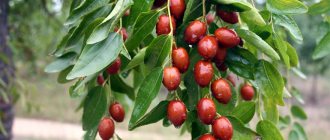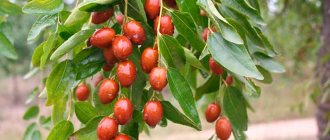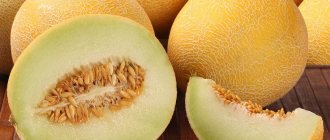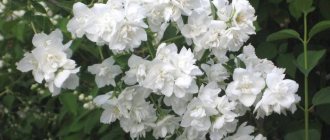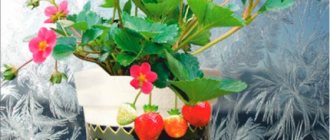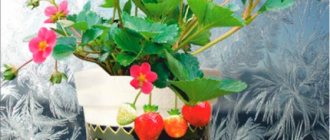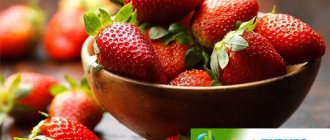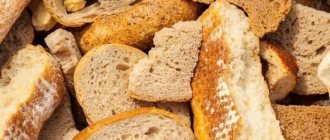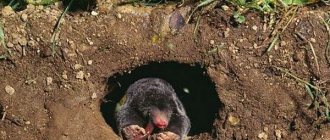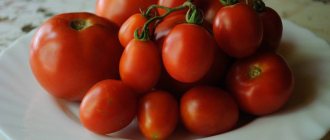Jujube is one of the most useful plants on earth. Eastern medicine considers fruits a panacea for many diseases. Chinese healers called it the “tree of life.” Unfortunately, this is a rare fruit crop in our country; few people know about it. Berries can be eaten not only raw, but also deliciously cooked. Jujube jam retains almost all the beneficial properties of the original product and is an excellent home remedy for seasonal colds and other illnesses.
How and where it grows
The unabi tree (Chinese date, jujube or jujube) has been growing in China for more than 4,000 years.
True jujube was brought to Europe only at the beginning of the 19th century. Unabi is grown in Madagascar, the Caribbean, and Europe. In Russia, this tree does well in regions with a warm climate, although it is also bred in the Moscow region - choosing the earliest ripening varieties.
You can recognize jujube by its elliptical leaves with spines at the base and rigid branched shoots. The flowers are yellow with a greenish tint and look like stars; the fruits are unabi with a stone.
Unabi varieties
More than 390 varieties of unabi are grown in China. The fruits of the Chinese date are fleshy drupes, round or oblong in shape.
The type of fruit varies depending on the variety:
- Mori Jer is a variety from Moldavian breeders. The tree produces large fruits, weighing up to 35 g, with an elongated cylindrical shape. The harvest is produced by the second ten days of September. Withstands temperatures down to -25 degrees Celsius.
- Chinese 2A. Ripens by the end of October. It has large fleshy fruits weighing up to 25 grams.
- Candy. Fruits in mid-September. The berries are small (up to 8 g), very sweet.
- Koktebel. Grown in the Nikitsky Botanical Garden, Crimea. The fruits weigh up to 52 grams and are up to 5 cm in length.
- Chinese 93. Leader in yield. The fruits are medium-sized (up to 25 g) and oval in shape.
Unabi is very fruitful and unpretentious, easy to care for at home; in areas with a suitable climate (hot, dry summers and moderately cold winters) it can grow up to 9-10 m.
In Russia and Ukraine, Chinese varieties of jujube are more common (among all of them they are the most resistant to cold) and those that were already bred here (like the Crimean koktebel).
The benefits and harms of dates
Dates are a sweet and healthy treat that can replace candy or sugar. The fruits contain B vitamins, carotene (provitamin A) and vitamin K. Among the mineral components, fruits are especially rich in potassium, contain calcium, phosphorus, magnesium and iron.
Small amounts of sodium, zinc, copper and manganese are also retained. The calorie content of dates reaches 280-340 kcal per 100 grams of product, depending on the variety.
This year at the nursery I was treated to some interesting fruits. They are similar to dates, only lighter in color and not as sweet. It turns out that this is unabi, or, as it is also called, a Chinese date, which also grows here.
Unabi fruits are valued for their dietary and medicinal properties. We usually grow wild varieties of this plant. But large-fruited varieties and forms were brought to the Sochi Experimental Station back in the 50s of the last century.
Wild species are grown in the form of a bush, and varietal grafted seedlings are grown in the form of a tree. Unabi blooms late - in mid-June, so it is never damaged by frost. Trees begin to bear fruit in the second or third year after planting.
Among the most productive and large-fruited varieties are the varieties Vakhsh, Khurman, Yuzhanin, Finik, the medium-fruited varieties - Burnim, Kitayskie 60, 93, the small-fruited productive form - Sochi 1.
The fruits ripen already on the 70-80th day after flowering. At this time, the Chinese date requires more moisture and heat than usual. The average weight of the fruit is 10-14 g, the maximum is about 40 g. The skin of the fruit is thin, yellow or red. The pulp is white, thick, crispy, sweet.
Ripe fruits can be left on the tree for two to three weeks, then they dry out and become especially tasty. In general, the fruits strongly resemble dates. They can be stored in the refrigerator for a long time – up to two months.
The lifespan of the Chinese date is 120-150 years. In southern Russia, unabi is more frost-hardy and winter-hardy than grapes. And in summer, the bushes can withstand heat up to +50° C without any problems. At the same time, unabi is very photophilous and bears fruit well only in the sun. In the shade, the bushes practically do not bear fruit.
The date palm (jujube, unabi) is a popular indoor plant for exotic lovers living in Russia. It can be successfully grown in a summer cottage.
Content of vitamins and minerals
Jujube, resembles an apple or Hungarian plum. This fruit is little known here, but it has been used in traditional Chinese medicine for more than 4,000 years. It's easy to guess that this fruit with red or brown skin and sweet pulp has a number of health benefits.
| Vitamin content in 100g jujube | Energy composition of jujube:
| Mineral content per 100g, mg | ||
| Vitamin A | 40IU | Potassium | 250 | |
| Vitamin B1(thiamine) | 0.02 mg | Phosphorus | 23 | |
| Vitamin B2 (riboflavin) | 0.04 mg | Magnesium | 10 | |
| Vitamin B3 (niacin) | 0.9 mg | Calcium | 21 | |
| Vitamin C | 69mg | Zinc | 0,05 | |
| Vitamin B6 | 0.08 mg | Sodium | 3 | |
| Iron | 0,48 | |||
A handful of fresh jujube fruit contains about 100 mg of vitamin C. This corresponds to approximately 50% of an adult's daily requirement.
Unabi cultivation
It is a sun-loving, drought-resistant, frost-resistant and hardy crop. Trees very rarely get sick and are not susceptible to insect infestation. And later awakening, at the end of spring, prevents spring frosts from damaging the flowers.
This is a super-intensive crop that can bear fruit already in the year of grafting. With suitable care, at 3 years of age, unabi seedlings can produce a harvest of more than 10 kg.
Here are the conditions that will help you grow a healthy tree:
- Loamy, breathable soils are preferred. If the soil is heavy and clayey, add sand to it when planting. An area with a high groundwater level is absolutely not suitable.
- The culture is very photophilous. In the shade, the tree will develop poorly, productivity will decrease, and the fruits will be small.
Important: Only young seedlings need watering; the roots of adult trees go deep into the ground and extract moisture on their own
- Fertilizer applied to the planting hole nourishes the tree for several years. In the future, the trees are fed every year.
- In winter, young seedlings are covered with branches and leaves, or the grafting site is covered with earth. Mature trees can withstand the winters of Ukraine.
- The plant is formed into a bush or tree. Periodically prune dry branches and shoots growing inwards.
Preparing to plant jujube plants
Important: For pollination, at least two trees of different varieties are planted in the garden.
Jujube reproduction
Plants reproduce by cuttings, root suckers and seeds.
When cutting, 2 top leaves, shortened by half, are left on cuttings 10 cm long. Plant in a greenhouse on the street or in the house. Ventilate and water periodically. When shoots appear, the film is removed and transplanted into the garden in the spring.
To grow jujube from a seed, it is first stratified. With the arrival of spring, plant 2-3 pieces per hole, with an interval of 30 cm, and cover with film. When the shoots appear, the cover is removed and the crops are thinned out.
Important: The root shoots are hilled up several times over the summer to create a seedling with developed roots. In the fall, dig up and plant separately.
Unabi growing at home
You can also grow unabi berries indoors, but you need to understand that the harvest will be small. For the tree, choose the most spacious and brightest place. In winter they are additionally illuminated.
When planting, a drainage layer is laid in the tub. A loose, fertile mixture is used as soil. Growing temperature in winter is +16°C, in summer - about +25°C. When it is warm, water moderately; in winter, the top layer of soil is covered with damp sawdust and periodically moistened with water.
Important: Adult jujubes are replanted every 3–4 years. Every year the top layer of soil is replaced with a new one, adding humus
In the summer, if possible, put the tree outside; if this is not possible, artificial pollination is carried out.
Jujube tree at home
Unabi decorates the terrace
Recommendations for use and application
Dried jujube is the most common form of fruit consumed by humans. This fruit is used in cooking, medicine, and cosmetology. Let's take a closer look at the options for using Chinese dates and their properties.
In cooking
Many ways have been invented to dry jujube, since dried unabi has become widespread in many culinary recipes. Delicious preparations made from it are especially popular. This way, it is possible to preserve the beneficial properties of the jujube fruit, so that you can then prepare delicious dishes.
Jam
The recipe for making delicious jujube jam requires the following ingredients:
- 0.8 kg of dried jujube berries;
- the same amount of sugar;
- half the amount of water;
- sachet (10 g) citric acid.
The cooking process consists of the following steps:
- Wash the jujube berries, dry them, and prick all the berries with a fork.
- Add citric acid and sugar to boiling water. Lightly boil the mixture, then pour the sweet syrup over the jujube fruits.
- After a few hours, put the berries on the fire and cook, stirring continuously, for half an hour.
- Divide the finished jam into sterile containers and cover them with lids to preserve the properties of the product.
Compote
The properties of Chinese dates are often used to prepare vitamin compotes. This does not require specific culinary knowledge. For the simplest recipe you will need the following components:
- 0.9 kg of dried jujube fruits;
- 2 tbsp. l. honey;
- 3 liters of water.
The cooking process consists of the following steps:
- Pour water over the Chinese unabi date and cook for half an hour until the whole fruit softens.
- Squeeze the unabi berries. Continue to cook the resulting liquid until the mixture becomes thick.
- Add honey and pour everything into jars. Before drinking, dilute the compote with a little water, obtaining the properties of a delicious tea.
Pickled fruit
An original way to prepare jujube unabi is to pour marinade over garlic-stuffed Chinese dates. This dish will become an independent snack or will complement the taste properties of a meat recipe. For preparation the following components are required:
- 2 kg jujube berries;
- a glass of apple cider vinegar;
- 10 g bay leaf;
- 5 g black peppercorns;
- 15 g garlic;
- the same amount of sugar;
- 50 g fine salt;
- half a glass of sunflower oil;
- 1.5 liters of water.
The cooking process consists of the following steps:
- Wash the green jujube berries and dry them.
- Place peeled garlic, bay leaf and pepper inside the jar.
- Pour in the Chinese date, cover it on top with a bay leaf and a clove of garlic.
- Heat the water well (do not boil). Add vinegar, sugar and salt, boil the jujube a little until the ingredients are completely dissolved.
- Pour the resulting marinade into the jar, followed by vegetable oil.
- Close the container with a lid and place the pickled jujube for storage in a cool room.
For medicinal purposes
The healing properties of the Chinese date have ensured that the product is actively used for medicinal purposes. Traditional healers recommend preparing an alcohol tincture and stocking up on unabi extract, which is sold by the company Ipar. It’s easy to prepare some recipes at home that can help a person during a difficult period.
Ointment
Mix jujube leaves and olive oil in a ratio of 1:5, heat without bringing to a boil, then leave for 10 days and strain. The resulting cream can be used for abscesses, tumors or ulcers - its properties can eliminate these problems.
For weight loss
The low calorie content of jujube makes the berries perfect as an additional dessert or as an independent dish during fasting diets. By periodically adding unabi to the daily menu, a person feels a significant surge of energy and strength, he will notice the tightening of his skin, the restoration of the natural shine of his nails and hair.
How unabi is used in cosmetology
Cosmetologists actively use compositions from Chinese dates. Unabi masks and decoctions help restore facial skin, fight dandruff, and help with baldness.
Mask for the face
Jujube effectively eliminates acne, abscesses and irritations on the face. The cream is prepared using fresh jujube leaves and olive oil, diluting them in a ratio of 1:5. the composition must be heated (but not boiled). After 10 days you need to insist. Store the resulting product in the cold, lubricating problem areas with it if necessary.
Unabi for hair
Decoctions prepared from the components of the jujube tree effectively help defeat dandruff. They prevent blockage of the sebaceous glands in the hair and prevent hair loss. The solution actively restores hair follicles and significantly strengthens growing hair.
How to make unabi jam in a slow cooker
Place the berries in a pressure cooker. Pour sugar on top and mix everything well with a silicone spoon. Close the lid and set the timer for 15 minutes.
Ingredients:
- jujube – 2 kg;
- sugar – 1.2 kg.
After the sound signal indicates the end of cooking, wait 10 minutes until the pressure decreases slightly. The jam can be taken out and poured hot into pre-prepared jars. The output should be 3 cans of 3 liters each.
Main healing properties and indications for use of unabi
Jujube can relieve a huge number of different symptoms and diseases. The main ailments that French breastberry successfully treats include:
- kidney diseases - fleshy and juicy unabi fruits are widely used in urology for the treatment of inflammatory processes, the risk of urolithiasis, etc. They have good antimicrobial, diuretic and tonic properties. Timely and correct removal of fluid from the body allows you to quickly cure inflammation and get rid of the discomfort associated with fluid stagnation in the kidneys. Healing fruits, due to their composition, gently stimulate the urinary system to work correctly, cleanse the kidneys, prevent swelling and help remove unnecessary substances from body tissues;
- insomnia, restless sleep – jujube and its seed extract have excellent sedative properties. The natural combination of components will gently and carefully calm not only the body, but also the mind, and give a healthy, pleasant sleep;
- treatment and prevention of colds and other inflammatory diseases - the high content of antioxidants, vitamins C, A, as well as various acids and organic substances make it possible to take unabi as an effective means to improve immunity;
- the presence or risk of anemia - the fruits of the Chinese date contain iron, zinc, phosphorus and copper, allowing you to restore the correct balance of these trace elements in the blood and the human body. Regular consumption of jujube relieves symptoms of this disease such as muscle weakness, fatigue, indigestion, dizziness, etc. Thanks to the normalization of iron and phosphorus levels, the blood is better saturated with oxygen, which improves the functioning of all internal organs and the well-being of a person in general;
- disorders of the digestive system, constipation - the fruits contain saponins, fibers and triterpenoids, which play an important role in the quality absorption of food and the healthy, proper passage of food through the entire gastrointestinal tract. Regular consumption of jujube prevents painful spasms, excessive gas formation, constipation and other unwanted “symptoms”, normalizing the functioning of the gastrointestinal tract;
- treatment and prevention of osteoporosis - unabi fruits are rich in minerals and trace elements in a highly digestible form, which allows you to naturally restore bone health.
In addition, jujube is useful:
- in stressful situations;
- as a means for weight loss;
- for healthy skin and hair;
- for blood purification;
- as a prevention of tumors and oncological diseases;
- for the treatment of stomatitis;
- as a choleretic agent, etc.
Contraindications
- Diabetes may be a contraindication to consuming jujube, because the high carbohydrate content can affect blood sugar levels.
- It should be used with caution by people suffering from allergies.
- For the treatment of insomnia, it is advisable to consult a medical practitioner because "date" is sometimes inappropriate in some cases of insomnia.
- It is not recommended to eat the fruit for people with little appetite or suffering from severe flatulence after eating.
- Undesirable effects: The fruit kernel is rich in oils and may, according to traditional Chinese medicine, cause or worsen diarrhea or nausea in people with digestive problems.
- In rare cases, eating large amounts of jujube may cause drowsiness.
- Due to its properties that stimulate contraction of the uterine muscles, it is not advisable to consume jujube during pregnancy.
- When breastfeeding, you need to ensure that your baby does not develop allergies.
Healthy jujube recipes
Since jujube has a wealth of useful properties, its composition is used both in cooking, cosmetology, and folk medicine. Therefore, let’s look at several simple and effective recipes for preparing jujube.
jujube decoction
. To prepare, take 5-10 fruits, pour unabi with boiling water (half a liter) and boil in a water bath for 30 minutes. Then cool, filter, squeeze out the fruits, and bring with boiling water to the original volume.
Jujube fruit decoction will also help normalize blood pressure, but for this to happen, you need to consume it daily for three hours. months of jujube, many immediately feel the beneficial effects of flavonoids - blood circulation improves, blood pressure and heart function are normalized and improved.
Jujube tea
calms nerves, normalizes sleep, relieves anxiety. To prepare it, take 10-15 berries and pour a liter of boiling water, let it brew for 10-15 minutes and add honey to taste. The beneficial properties of honey will enhance the calming effect and relieve insomnia gently and without decoction.
addiction from the roots
The plants are used as a hair strengthening agent; by rubbing it into the scalp, you can not only restore your hair, but also prevent baldness. Other folk recipes for hair loss also give good results.
Syrup based on jujube
. Sort through the fruits, prick each one, weigh them, and use a fork. Depending on the quantity, cook the syrup.
For one kilogram of fruit we take 800 grams (for those with a sweet tooth, 1 kg of sugar), 12 grams of citric acid and 375 ml of water (if you take a kilogram of water, then take two glasses of sugar). Boil the Fruits.
Place the mixture in a convenient container (you will later cook the jam in it) and pour boiling water over it. let the mixture steep for 8 hours (the cooking process can be done in the evening to prepare the jam in the morning).
In the morning, boil a mixture of syrup and berries, boil it over low heat for 25 minutes and pour into the jars, which were sterilized in the morning. Tighten and leave the lids to cool, then transfer the jars to a dark and cool place.
Recipe for jam to reduce blood pressure.
For jam it is better to use unripe hard fruits. Boil syrup from 700 g of sugar, 800 g of sand and 1 liter of water for each kilogram of fruit. Wash the jujube, prick it and place it in a saucepan. cooked Pour in the syrup and boil for a couple of minutes. Fire Turn off and set aside for 7 hours.
Remove the seeds and grind the fruits using a blender so that the beneficial substances from the skin are preserved. Only in this case the medicinal properties of the jam will be stirred. maximum, bring the fruit mass to a boil over low heat and simmer for 5 minutes.
Turn off the heat and immediately pour the jam into sterilized jars and seal the lids tightly. After cooling, the aromatic jujube jam thickens.
More about useful products:
How to store jujube jam
Jujube can be prepared for the winter in different forms, for example, dried, frozen, pickled, prepared compotes, jam. In order for the twists to be stored all winter, you must follow a number of recommendations:
- canning jars must be sterilized and dried; jam should not be poured into wet containers;
- the most suitable container volume for storing jam for the winter is 0.5 liter jars;
- To prevent the jam from becoming moldy, add lemon juice or acid to it;
- The denser the consistency of the jam, the longer it will be stored.
Properly cooked and preserved jam can be stored for a very long time at room temperature. A suitable place could be a storage room, basement, cabinet on an insulated balcony.
or Jujube Chinese date or unabi
others and There are names for these fruits: “unabi”, “also”, and jujube “Chinese date”. The berries are found in large quantities in Asia, Europe, Japan and more often. In Australia, the plant can be found in sunny areas on the slopes of mountains and hills.
It is also used as a tonic and diuretic. The fruit contains a large amount of ascorbic acid, which increases and strengthens the immune system. In addition to vitamin C, this helps the body resist the effects of infections and viruses.
To treat various diseases, not only the fruits are used, but also other parts of the plant. Jujube berries are recommended to be included in the diet of people with liver problems and hypertension. In addition, the fruits are useful for bronchitis, tracheitis and some throat problems. If a decoction is prepared based on the leaves and bark, it can be used for lung diseases, as well as as a lotion for skin problems.
Unabi (jujube) can be harmful to people with individual intolerance to the product. Pregnant women should limit the number of fruits and avoid decoctions and infusions from the plant.
Composition of jujube fruits
All parts of the “tree of life” are used for medicinal purposes: bark, leaves, seeds and fruits. Unabi fruits contain the following:
Vitamin components
| Vitamin name | Quantity (approximate) per 100 g of product |
| Vitamin A (Retinol) | |
| Vitamin B1 (Thiamin) | |
| Vitamin B2 (Riboflavin) | |
| Vitamin B6 (Pyridoxine) | |
| Vitamin C (Ascorbic Acid) | |
| Vitamin PP (niacin) | |
| Vitamin P (rutin) | from 0.29 to 0.95 |
Also present is vitamin E (Tocopherol), nicotinic and folic acid, catechin, carotene and other trace elements.
Minerals
| Name of mineral | Quantity (approximate) per 100 g of product |
| Manganese |
In fact, each jujube fruit is an independent, natural complex of vitamins and microelements.
The nutritional value
100 grams of product contains approximately 79 kcal.
Correct usage
Compliance with the rules regarding the use of the product will allow you to derive exclusively benefits from it, without causing any harm to the body.
Preparation, how to select and store
When choosing fresh fruits, you should pay attention to their density and color. Ripe berries are red-brown in color and should be preferred
You should not buy soft or wrinkled drupes that have damage or signs of rotting on the skin. When purchasing dried fruit, it is recommended to inspect the packaging for integrity. The expiration date of dried fruits also plays an important role; they should not be expired. Fresh berries are stored at room temperature for about 7 days. When stored in the refrigerator, they retain their freshness for a month. Dried drupes can be stored in a dry place for 2 years.
Fresh and dried fruits
Fresh and dried fruits can be included in the menu either separately or in combination with other products. However, you should not abuse the product by eating a large number of berries at a time. The maximum daily dose of drupes is 25 pieces. Experts recommend dividing the daily dose into several doses. The chemical composition of fresh drupes and dried fruits is almost identical. However, due to the lower water content in dried jujube, the concentration of biologically active substances in them is significantly increased. Therefore, people with disorders of the immune system are recommended to introduce dried fruits into their diet, due to their high content of ascorbic acid.
Fruit decoction
To prepare a healing drink:
- It is enough to take 60 g of fresh berries and 600 ml of water.
- The drupes are filled with water and placed on low heat to cook.
- The mixture must be boiled for 12-15 minutes.
- Afterwards, the drink is removed from the heat, cooled and filtered.
- Next, the raw material is squeezed out, and the amount of liquid is brought to its original volume using boiled water.
A decoction of the fruit is effective for hypertension and respiratory diseases such as bronchitis, laryngitis, tracheitis, whooping cough, etc. If the decoction is used to lower blood pressure, it must be taken daily for 90 days. For respiratory diseases, the medicine is taken until the main symptoms disappear. A single dose of medicine is ½ cup. Frequency of administration – from 4 to 6 times a day.
Decoction of roots or bark
A decoction based on the bark or roots of the plant has a strengthening effect, so it is recommended to take it for diarrhea. The decoction is also suitable for the treatment of hypertension and cough. In addition, the liquid can be used externally to treat dermatological diseases.
Decoction ingredients:
- roots or bark - 2 tbsp. l.;
- water – 400 ml.
The plant is filled with water and simmered over low heat for 15 minutes. The cooled liquid must be filtered. It is recommended to take the medicine 2 tbsp. l. 30 minutes before meals. This decoction can also be used to restore weakened hair. A decoction used as a rinse will not only restore the hair’s former elasticity, but also strengthen the hair follicles.
Leaf infusion
To prepare the medicine:
- You need to take 1 tsp. dry crushed leaves and 250 ml of hot water.
- The liquid should be infused under a closed lid for an hour, during which time the raw material will have time to release all its beneficial substances to the water.
- Before use, the infusion must be strained thoroughly.
The medicine is taken 2-3 times a day, 3 tbsp. l. at a time. The infusion is effective for muscle spasms, neuralgia, neurosis and insomnia. The medicine is also effective for respiratory diseases, as well as pathologies of the respiratory tract. When preparing an infusion for external use, it is necessary to increase the amount of raw materials used to 1 tbsp. l. This infusion can be used to wash purulent wounds, cuts and ulcers on the skin.
Jam
Jujube fruit jam according to the classic recipe has similar properties as fresh berries, since the fruits do not lose their beneficial qualities during heat treatment. To prepare you need to take:
- Jujube drupes – 1 kg.
- Sugar – 600 g.
- Water – 400 ml.
Pour water into an iron container and bring it to a boil. Then add 150 g of sugar to the liquid and cook the syrup. The washed berries are poured with sugar syrup and infused for about 60 minutes. Next, the mixture is placed on low heat and boiled in a closed container for 25 minutes. To improve the taste, you can add citric acid or cinnamon to the jam. Jam helps strengthen the immune system, normalize the functioning of the heart, as well as the digestive system.
Classic unabi jam recipe
Collect jujube fruits and add the same amount of sugar. Pour a little water into the bottom of the pan so that the fruits from below do not burn and do not stick to the walls until the berries release their own juice. You need to cook jujube until it becomes sticky like honey or even thicker.
Ingredients:
- jujube – 2 kg;
- sugar – 2 kg;
- water – 50 ml.
So, sprinkle the fruits with sugar and cook as usual jam over low heat for about 1.5 hours. The berries are obtained in a thick syrup, as if in honey. The output should be about 3 liters of jam. Pour the hot mass into clean, sterile jars and roll up.
Botanical characteristics of jojoba
A shrub or tree with thorns reaches a height of 10 m. It forms a spherical crown and branches at the base. The bark is dark, thick with cracks in old trees, smooth in young trees. The leaves are dense, leathery, oval, with jagged edges. Leaf length up to 5 cm.
Unabi flowers are single or collected in a bunch. During abundant flowering, there are up to 300 pieces on the bush. The fruits are fleshy. The shape differs depending on the type - spherical, pear-shaped, round, ellipsoidal. In wild plants, the fruits are always smaller - up to 2 cm, in cultivated varieties - 5 cm. Unripe jujube with pale green skin. As it ripens, it darkens to a dark red-brown color. The pulp is dry, dense, sweet. White or green.
Storage
Chinese dates should be stored in a dry and dark place. It is best to eat unabi immediately after ripening - when the green fruit turns red-brown and the surface becomes soft with a slightly wrinkled skin.
Before eating an unfamiliar, rather exotic fruit, you should learn about the benefits and harms of jujube. People suffering from any diseases should consult a doctor before using any medicinal tinctures and teas.
How dates grow
In the wild, dates can grow on trees and shrubs.
Date palm in the wild
The plant grows rapidly in tropical climates and in the deserts of warm countries.
In what countries
The natural environment for the development and fruiting of dates is North Africa and the countries of the Middle East. Settlers of modern Saudi Arabia, Tunisia, Morocco and Egypt have been cultivating plants of the Palm family for more than 6 thousand years. At the same time, Indians dispute the claims of Africans, considering their ancestors to be pioneers in the cultivation of dates.
The current list of countries where palmate dates grow includes Iraq, Bahrain, Algeria, Iran, United Arab Emirates, Tunisia and Syria. Palm trees are found in the USA, Egypt, California, Mexico and Australia. The undisputed leader in the export of dates grown on its own lands is Saudi Arabia.
Distribution in the wild
Palm trees take root well on sand, clay and heavy soils with moderate salinity. Plants can withstand long periods of drought, but some species require stable water consumption. The need is easily met by periodic river floods and groundwater.
Interesting! The ideal temperature for flowering and fruit formation is +17°C. Male and female specimens bloom from February to November.
Dates reproduce by seed. They are pollinated by the wind. It takes 200 days for the fruit to ripen. What do ripe dates look like on the tree? The texture of freshly picked hard dates is dry and fibrous, with a brownish tint.
Where do dates grow in Russia?
Date bushes require a humid climate to grow and bear fruit. In the subtropical regions of Transcaucasia, as well as in the adjacent subtropics of Iran, the summer period is hot and dry. In winter, Mediterranean cyclones pass from the northern side, and Iranian cyclones pass in the southeast. Growing date palms south of the Caucasus Mountains gives good results.
Interesting. You can admire exotic palm trees in Sochi, but due to the lack of comfortable conditions for the plant, the quality of the fruits on the bushes is low. Collections of botanical gardens where forest and rejected dates are grown are found in the subtropical part of Krasnodar, but these varieties have not become widespread.
Growing in the countries of the former USSR
In post-Soviet times, many experiments were carried out on the acclimatization of palmate dates on the territory of the USSR. However, successful growth and fruiting of palm trees have been noted in the dry subtropics of southern Turkmenistan. The abundance of fruits in Kazakhstan, Uzbekistan, Tajikistan and Kyrgyzstan are imported from southern countries. In the Black Sea subtropics, palm trees grow weakly and die quickly in conditions of high humidity.
The Canary date is more resistant to excessive dampness and is widely cultivated as an ornamental shrub in the Krasnodar Territory, Abkhazia and Georgia.
Ripening dates in Adler
Individual specimens of Canary palms grow in the south of Crimea and in Azerbaijan (Baku, Lankaran). Planting date palms in open lands of Ukraine is unsuccessful, even with winter shelter.
Main healing properties and indications for use of unabi
Jujube can relieve a huge number of different symptoms and the main ones. Diseases and ailments that the French pectoral berry successfully treats include:
- kidney diseases
- the juicy and fleshy fruits of unabi are widely used in urology for the treatment of inflammatory processes, the risk of urolithiasis, etc. They have good diuretic, antimicrobial and tonic properties. Timely and correct removal of fluid from the body allows you to quickly cure inflammation and get rid of the unpleasant sensations associated with stagnation of fluid in the kidneys. Healing fruits, due to their mild composition, stimulate the urinary system to work, cleanse the kidneys, prevent swelling and help tissues remove unnecessary substances from the body; - insomnia, restless sleep
- jujube and the extract from its seeds have excellent sedative properties. The natural combination of components will gently and carefully soothe not only the body, but also give the mind a healthy, pleasant sleep; - treatment and prevention of colds and other inflammatory diseases
- the high content of antioxidants, vitamins C, A, as well as various acids and organic substances make it possible to take unabi as an effective means of increasing immunity; - there is a risk or occurrence of anemia
- the fruits of the Chinese date contain iron, zinc, phosphorus and copper, allowing the correct balance of these microelements to be restored in the human body and blood. Regular consumption of jujube relieves the symptoms of this disease, such as muscle weakness, fatigue, indigestion, etc. dizziness, normalization of iron and phosphorus levels, better blood saturation with oxygen, which improves the functioning of all internal organs and the well-being of a person in violation; - the overall functioning of the digestive system, constipation
- fruits contain saponins, fibers and triterpenoids, which play an important role in the quality absorption of healthy foods and nutrition, the correct passage of food through the gastrointestinal tract. Regular consumption of jujube prevents painful spasms, excessive gas formation, other unwanted “symptoms”, and constipation, normalizing the work of treatment; - Gastrointestinal tract and prevention of osteoporosis -
unabi fruits are rich in minerals and microelements in a well-digestible form, which allows you to naturally restore health.
bones of this, jujube is useful:
- in stressful situations;
- as a means for weight loss;
- health for skin and hair;
- for cleansing quality;
- in the blood for the prevention of tumors and oncological diseases;
- treatment for stomatitis;
- as a choleretic agent, etc.
properties Positive unabi make this fruit a true panacea for most known diseases. But, unlike modern medicines, the Chinese date provides effective natural help - rejuvenating cells, giving strength to the body and the necessary microelements for self-healing, which is much more effective and better than many modern ingredients.
General beneficial properties of Crimean jujube
Despite the many beneficial properties that unabi has, not everyone knows about the existence of this plant in our country. Crimean jujube is particularly resistant to various diseases and pests, which makes it possible to obtain an environmentally friendly product, since insecticides and other chemicals are not used in the process of growing the bush.
What it is?
Jujube belongs to the plant genus of the same name and the Krushinaceae family. The plant is a deciduous shrub or tree, up to 10 m high, native to tropical and subtropical regions of Asia, the Mediterranean, Australia and Japan. As a cultivated plant, it can also be found in the Caucasus and Crimea. The branches of the plant are strewn with whole elliptical leaves. Green leaf blades sit on short petioles. During the flowering period, miniature greenish-white flowers appear on the bush. The fruits of the plant are small fleshy drupes, round, oval or pear-shaped. The surface of the berries is smooth and shiny, and their pulp is juicy and sweet. Mature drupes are dark brown with a slight hint of red.
Chemical composition and effects on the body
Chinese jujube contains many elements necessary for the normal functioning of the body. So the fruit contains:
- carbohydrates;
- organic acids;
- glycosides;
- tannins;
- saponins;
- terpenoids;
- neomirtilline;
- pectin;
- flavonoids;
- vitamins (C, K and group B);
- folic acid;
- microelements;
- essential oil.
Regular consumption of fruits helps strengthen the immune system, normalize the gastrointestinal tract and cardiovascular system. In addition, the product:
- Accelerates the process of tissue regeneration.
- It has a hypotensive, anti-inflammatory, sedative and hemostatic effect.
- Removes heavy metal salts from the body.
- Improves metabolism.
- Relieves constipation.
- Helps the body cope with fungal diseases.
The presence of shrub drupes in the diet has a beneficial effect on overall health.
Kinds
There are currently about 400 different varieties of jujube. However, only some of them are suitable for growing in the climatic conditions of Crimea.
The most commonly grown varieties on the peninsula are:
- Chinese 2A. It differs from its relatives in the large size of the fruits, the weight of which reaches 10 g. The texture of the drupes is dense. The berries of this variety have a sweet taste, making them suitable for making jam.
- Candy. One of the sweetest plant varieties. Its fruits are used in the production of sweets, marmalade and other sweets.
- Early ripening. A high-yielding variety, the fruits of which are most often consumed fresh.
Benefits of jujube for the body
The beneficial properties of unabi and its unique vitamin and mineral composition determined the use of the plant in. Like ginseng or eleutherococcus, unabi:
- tones the central and peripheral nervous systems;
- rejuvenates and regenerates cells;
- strengthens the immune system;
- normalizes metabolic processes in the body;
- disinfects;
- removes free radicals;
- gives a diuretic effect;
- removes bile;
- acts as an antioxidant (removes heavy metals, toxins, bad cholesterol, etc.);
- weakens toxicosis;
- has an anesthetic effect (especially effective in helping with toothache and headaches).
Jujube effectively lowers high blood pressure, soothes, and improves sleep. Regular use of jujube strengthens the heart and blood vessels, has a preventive effect against sclerosis, etc. Jujube is especially useful during the recovery period after operations or serious illnesses.
